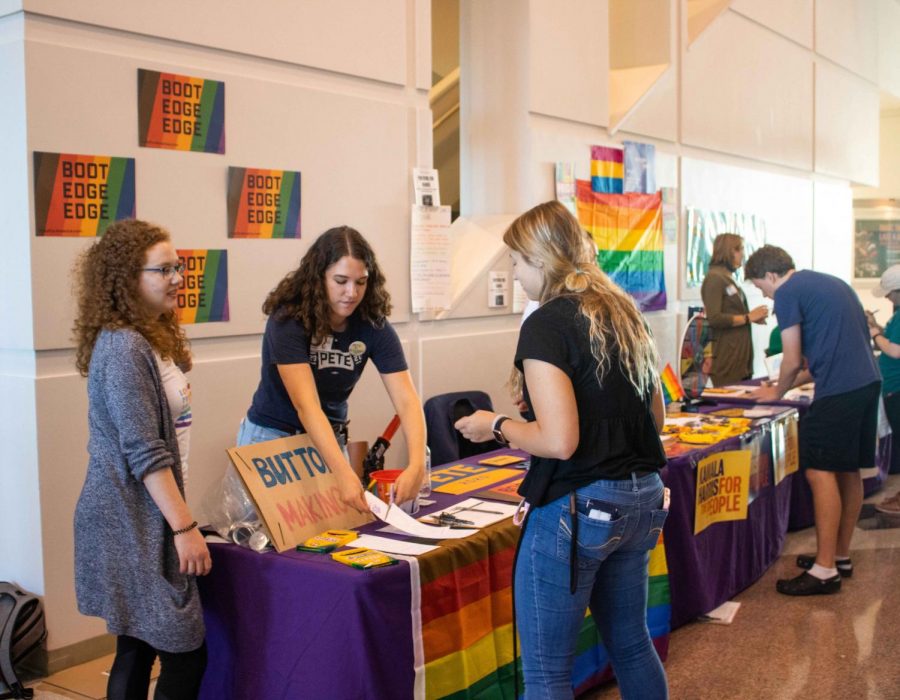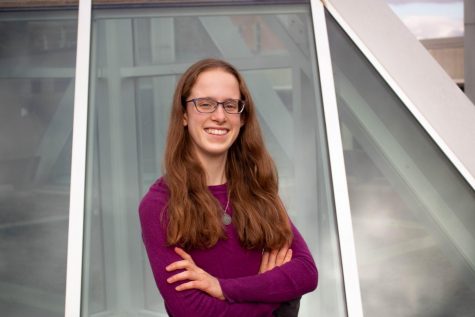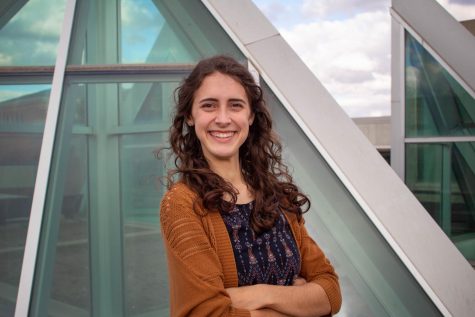Rainbow Reception welcomes students
Aug 29, 2019
More than 400 students and community members attended the annual Rainbow Reception, hosted by UNI Gender and Sexuality Services. The event, which took place at Gallagher-Bluedorn Performing Arts Center from 5-7 p.m. on Wednesday, August 28, was open to all LGTQ+ individuals and allies who wanted to celebrate with the community.
“Coming to UNI’s campus is the first time that [many students] have an LGBTQ+ community, the first time that it’s okay to be open as identifying as LGBTQ+ or being an out ally,” said Emily Harsch, Gender and Sexuality Services Coordinator. “This is kind of a big kickoff to celebrate our community, celebrate our allies, get everyone together, and get connected before the school year happens.”
Among the many organizations present were on-campus resources such as UNI Proud, Student Accessibility Services, NI Feminists, and the department of Women and Gender Studies. Off-campus groups were also present, including clinical resources from Unity Point Health and even information from presidential campaigns such as those of Pete Buttigieg and Kamala Harris.
“We are trying to be on campus as much as possible and… trying to reach out to every possible student group,” said Daniel Roth, a representative of the Harris campaign’s Panthers for Harris initiative. “[Kamala] has been so strong on [LGBTQ+ issues] since she joined public life, and it’s something that we want people to know about.”
Local churches also offered support for LGBTQ+ students.
“Jesus’ message was one of love and inclusiveness,” said Louise Odle, a representative of St. Timothy’s United Methodist Church. “We’re trying to be that kind of church as closely as we possibly can be.”
Junior biology major Emerson Slomka, a transfer student new to UNI this fall, was excited by the variety of local resources available for LGBTQ+ individuals.
“I transferred from a really small area, and as a transgender person, there really wasn’t a lot of resources for us or ways to meet other LGBT people,” he said. “This was a good way both to get resources and to meet new people who face similar issues.”
Midway through the event, key student and faculty leaders addressed the attendees. Among them was Dr. Thomas Davis, retired professor of health promotion, who recently donated an endowed scholarship for transgender students.
The scholarship was inspired by Davis’ friendship with a UNI alumnus who identifies as transgender. Through that friendship, Harsch said, Davis “learned about some of the struggles that people face in their everyday lives and realized that he had the potential to do something about it by supporting our students.”
To be eligible for the Thomas M. Davis Endowed Scholarship, students must self-identify as transgender either in the Admissions Application or through MyUNIverse. They must also have one semester of college credit. According to the Gender and Sexuality Services website, the student with the highest GPA will be selected.
For the 2019-2020 academic year, all students who have self-identified as transgender through one of the above methods by September 8th will be considered. In future years, the scholarship will be included as part of the general UNI scholarship application.
“This is the biggest donation that we’ve ever received in support of our transgender students, and it’s a huge deal that it’s happening on our campus,” Harsch said.
After the presentations, attendees continued to socialize, visit booths, and enjoy snacks provided by UNI Catering.
“The energy and enthusiasm of the college students has been wonderful,” said Odle.
In addition to LGBTQ+ individuals, Harsch emphasized the event’s importance for allies: those who may not identify as LGBTQ+ but want to support and advocate for those who do. She noted that there are many ways for allies to connect with the LGBTQ+ community on campus, including a Safe Zone Ally training which Gender and Sexuality Services will be implementing later this semester.
“LGBTQ+ pride also does include allies,” Slomka agreed. “If we separate straight cisgender people from LGBTQ+ people, there’s not really a way to communicate or to learn things from each other.”
















